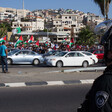Rights and Accountability 24 July 2015

The wife of Falah Abu Maria mourns over her husband’s body during his funeral in the village of Beit Ommar in the occupied West Bank, 23 July.
EPA/NewscomIsraeli forces have killed two Palestinians in the occupied West Bank since Wednesday.
Falah Abu Maria, 52, was fatally shot during a house raid in Beit Ommar, a Hebron-area village in the southern West Bank, at dawn on Thursday.
After breaking into the family home, a large squad of Israeli soldiers forced Ahmad, Falah’s eldest son, to identify his siblings for them. Upon saying his 22-year-old brother Muhammad’s name, a soldier shot Muhammad in the pelvis, according to an Arabic-language report at the news website Quds.
Alarmed at seeing Muhammad shot, Ahmad and his father tried to defend him from the soldiers who began firing indiscriminately.
“One of the soldiers pointed his rifle at the martyr Falah and shot him four times directly” in the neck and chest as he attempted to help his son, Falah’s brother, also called Muhammad, told Quds.
The soldiers pulled out after the shooting, leaving the horror they had caused behind, Muhammad said. It was left to the family to seek help, but by the time ambulances arrived it was too late for Falah. Falah’s son Muhammad underwent surgery and is in stable condition.
Falah’s wife told the Jordanian TV station Roya that Israeli forces had raided the family home repeatedly. Beit Ommar is a frequent target of army attacks because of regular protests villagers hold against the theft of their land for nearby Israeli settlements.
“We are the ones who are dead, my father, and you are alive with your Lord,” Haidar Abu Maria, another of Falah’s sons, told Roya reflecting the family’s anguish.
Later in the day, Israeli troops used rubber-coated steel bullets and tear gas to attack Palestinian mourners who came out for Abu Maria’s funeral. At least eight attendees were injured and a Palestinian ambulance’s window was shattered by an Israeli rubber-coated steel bullet, Ma’an News Agency reported.
With three killings already this month, the number of Palestinians slain by Israeli forces in 2015 has reached 17, Ma’an noted.
“Poor record”
Just a day earlier Muhammad Alawneh, 22, died in hospital shortly after being shot in the chest by Israeli Border Police in Burqin, a village near Jenin in the northern West Bank.

Relatives mourns at the funeral of Muhammad Alawneh at the youth’s funeral in Burqin village near the West Bank City of Jenin.
APA imagesIsrael occupation officials claimed he was picking up a stone to throw at the heavily-armed soldiers during protests against an armed Israeli incursion into the village. Though an Israeli military spokesperson said that the killing is being investigated, such probes almost never find soldiers culpable for killing Palestinians.
Dr. Nader Irsheid, director of the hospital where Alawneh was treated, told the Palestinian newspaper Alquds that efforts to save the youth’s life had failed due to the severity of the injury to his chest.
Thousands joined a funeral procession that started at the hospital in Jenin and ended in Burqin.
Killed “in broad daylight”
Earlier this month, an Israeli colonel shot dead Muhammad al-Kasbeh, 17, near the Qalandiya checkpoint between occupied East Jerusalem and the rest of the West Bank.
Although Israel initially claimed that the colonel fired his weapon because he was facing “mortal danger,” those claims were debunked by a video and medical evidence that al-Kasbeh was shot in the back as he attempted to flee after throwing a single stone at an Israeli military vehicle.
“The Israeli military has a poor record of bringing soldiers to justice for such acts,” a subsequent Human Rights Watch report observed.
“The military and senior politicians rushed to support [the colonel] before considering all the evidence,” Sarah Leah Whitson, the director of the group’s Middle East and North Africa program, said. “Even if the new video pushes the IDF [Israeli army] advocate-general to prosecute, it underscores the need, in any credible investigation, to collect and weigh all evidence, including, wherever possible, Palestinian eyewitness accounts.”
Palestinian, Israeli and international human rights watchdogs regularly decry Israel’s widespread human rights violations in areas across the West Bank, including East Jerusalem, and the besieged Gaza Strip.
Israeli soldiers and settlers who attack or kill Palestinians enjoy systematic impunity. Only 1.4 percent of complaints issued to Israeli military authorities between 2010 and 2013 resulted in an indictment, according to the Israeli rights group Yesh Din. Of these, very few result in more than symbolic punishment.
Among those given a free pass last year were the soldiers who lay in ambush and then killed 14-year-old Yousef al-Shawamreh in the village of Deir al-Asal al-Fawqa in March 2014, as The Electronic Intifada recently reported.
Although Whatsapp messages showed the soldiers knew al-Shawamreh was a child, they killed the boy nonetheless. The Israeli military closed the investigation into the child’s killing four months later without any indictments.
The child was killed “in broad daylight, although he posed no danger,” Israeli human rights group B’Tselem said, adding that the evidence “attest[s] to command responsibility for the unlawful shooting of al-Shawamreh.”
Tags
- Muhammad al-Kasbeh
- Qalandiya checkpoint
- Beit Ommar
- West Bank
- Gaza Strip
- Human Rights Watch
- Muhammad Alawneh
- Yousef al-Shawamreh
- Jerusalem Post
- Ma'an News Agency
- Burqin
- B'Tselem
- Impunity
- East Jerusalem
- Falah Abu Maria
- Muhammad Abu Maria
- Sarah Leah Whitson
- Deir al-Asal al-Fowqa
- Quds al-Akhbariya Network
- Hebron
- rubber-coated steel bullets
- tear gas
- stun grenades






Comments
Yet another horror heaped upon the World by Zionism
Permalink Zionism Is Not Judaism replied on
The racism (and evil) that is Zionism must end.
Whether there will ever be justice for this horrific act, one will never know; but that squad of modern day SS assassins and terrorists must be brought to trial for their crimes.
Killing of a father, wounding of his son
Permalink Dean Olson replied on
I deeply appreciate those who bring such witness to us, though daily it saddens, often horrifies and quite frequently angers me. The very attitude and actions these Jews are taking, now that they have rifles and the upper hand, is no different than the horrors they rip their shirts over and grieve from their past. Perpetrating such atrocities is never right, yet our "great democracy" turns not only a blind eye to what Israeli military forces are doing, we, our country, arms them and covers their back. The blood of this father is on many, many hands.